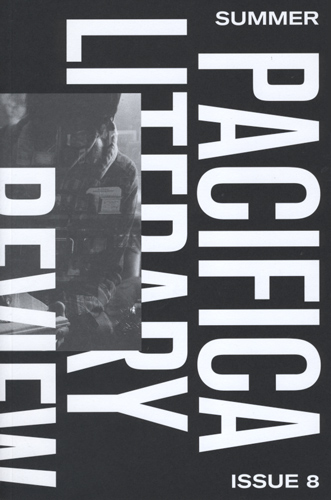Pacifica Literary Review – Summer 2016
Leave logic at the door when you step inside stories laid out for you in this issue of Pacifica Literary Review. They have just enough normality to allow you to accept the absurdities.
Leave logic at the door when you step inside stories laid out for you in this issue of Pacifica Literary Review. They have just enough normality to allow you to accept the absurdities.
Dacia Price’s “S is for Silence,” is a knockout debut involving a husband with a thunderous voice, a purloined pair of ear plugs, and an extended nap. The wife narrates: “The first time I heard [your voice], I thought it might shatter the glass of the cafe window, or crack the bones in my chest. I was gripped by the need to pull the table cloth around me, a flimsy security blanket.” When the husband decides to take a nap in September, the wife thinks: “Just an hour, you pled. Just an hour and you’d be back to your old self. I prayed your old self would vanish.”
A more widely published writer, Matt Rowan, tells a bizarre tale in “Aren’t We Required to Never Be.” Told from the perspective of a little girl, a lifelike Billboard is chief among the interesting characters that populate this unique story of Littles:
“Don’t worry, Littles. It’s all ok,” the translucent glowing arm of Billboard came in through a window to our room. It was trying to make us feel better. It pet Little Sister on the head. She was better almost right from the start of the petting. Billboard always gives that effect.
Michael P. O’Leary and Zach Powers round out the fiction category. O’Leary ushers us back to a 1776 expedition in “Or What is Now Called Arizona.” He introduces his story as an “Extant Manuscript Translated from the Spanish and Edited” by Theodore Peacock in 1901. Explorers encounter “an old woman of imbalanced temperament,” who seems a bit of a crone, and a “Jamajab man, his face lined with blue cactus-ink tattoos,” who was known as The Tongue. A murderous padre is also present.
Powers takes us for a harrowing ride to work in his weirdly riveting “Kill the Song of the Approaching Engine,” as they try to outdistance a mysterious Threat:
Free from the confusion of the city streets and the blob of traffic, the Threat assumes a more concrete shape. It is still not an object, exactly, except inasmuch as a cloud is an object. Were it above us, I would expect rain.
Photography by Rachel Endoso graces the magazine’s cover, and more of her works are displayed inside. Her collection, titled “Returning Home,” requires some scrutiny to distinguish all the images in the deeply shadowed black and whites, some appearing superimposed on each other. A few lines about her vision and technique would have been a nice addition to the issue.
Several poets add to the appeal of this magazine. The poetry is less surreal than the fictions, but it is by no means mundane. I like the way Lindsay Ahl writes in “Pearls” about Pearl Street, Pearl Harbor and, well, pearls:
what do you know about the truth of Pearl Harbor,
I’ll tell you,
it’s like a super encrypted cipher, like absolute radio silencethink pearl cultivation: nick the oyster, plant an irritant
do this 200,000 times, accidentally killing half the oysters
Andrew Stallings begins his poem “Paradise” with lines wanting to be read aloud:
It was late to get trenchant,
unwise to be strident, the
sense of a cycle extending
made me savage.
A lengthy prose poem by Cait Weiss called “Ode to the One Glove,” is driven by the suggestion: If it fits.
[ . . . ] The children see a body dragged from a truck & smashed like
a watermelon on pavement. Videos looped like a noose. If it fits.
[ . . . ] The children know OJ for: slow driving; glove
jokes; the fact that he is not a juice box; the rumor he probably did
it, but so what it’s not for you.
I wanted a little history on the magazine, so I looked up Pacifica Literary Review’s website. Editor-in-chief Matt Muth states that Pacifica began when he and a cofounder, “two writers who did not have nice things decided that they would make their own nice thing. And it turns out we made an incredibly nice thing, which is of course this thing, and we want you to get in on it.” That’s an excellent idea. You might want to try it yourself.
[www.pacificareview.com]





